WORCESTER — Three professors at Worcester Polytechnic Institute have been awarded $1.76 million dollars in state and federal funding to produce electronic gloves that can operate robotic systems at a distance.
The $1,764,938 award was issued to professors Pratap Rao, Cagdas Onal, and Zhi Li. Rao, who is an associate professor in WPI’s mechanical and materials engineering department, is the project’s principal investigator (PI). Onal and Le, who both work as associate professors in the college’s robotics engineering department, are the project’s co-PIs.
“The glove we develop will allow humans to better collaborate with robots,” Onal said in a statement. “Users wearing the glove will be able to train robotic equipment how to move. In other applications, humans may learn a task by training on robotic equipment.”
According to a release from WPI, $920,696 of the $1,764,938 total award was made possible by federal funding generated by a cooperative agreement between SEMI-FlexTech and the Army Research Laboratory. Based in California, SEMI-FlexTech is a membership-based consortium of technology companies interested in advancing the development of flexible electronics.
The remaining $844,242 was issued by the state from the Massachusetts Manufacturing Investment Initiative (M2I2) to purchase the equipment needed to manufacture and test the prototype glove. M2I2 is Massachusetts’ arm of Manufacturing USA®, a federally sponsored network that provides funding for collaborations between the private sector and academia. This aspect of the award was also granted to UMass Lowell, which will be collaborating with WPI on this research project.
“Through the M2I2 program, the Commonwealth has committed over $100 million to boost innovative projects across the Commonwealth that will enhance the competitiveness of our advanced manufacturing sector,” said Christine Nolan, the director of the Westborough-based Center for Advanced Manufacturing at MassTech, which manages the M2I2 program.
The researches expect to have a completed prototype for the glove in a year and a half. The initial design for the glove includes integrated circuits printed onto the glove’s fabric. They will be powered by batteries that the user will hold in their pocket. Once actualized, the gloves will allow humans to tele-operate robots or train them how to complete tasks using human movement. Robots will also be able to use the gloves to train humans on tasks as well.
“A fully integrated glove that allows a human to operate or train a robotic system could be used in advanced manufacturing settings, warehouses, remote health care, hazardous situations, and other applications,” Rao said. “In addition, the production methods and wearable technologies we develop will benefit Massachusetts by expanding the state’s manufacturing capabilities and the expertise of Massachusetts workers.”






Leave A Comment